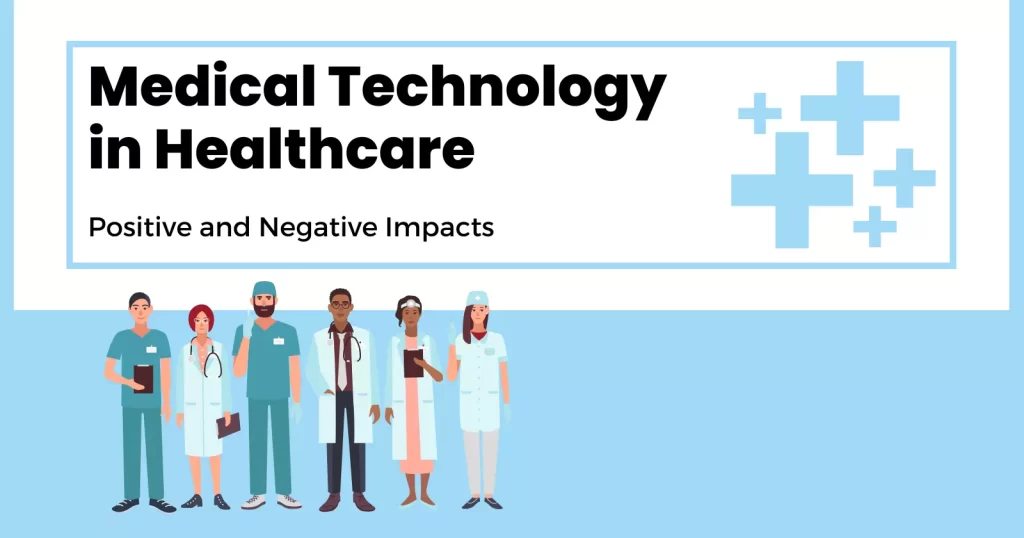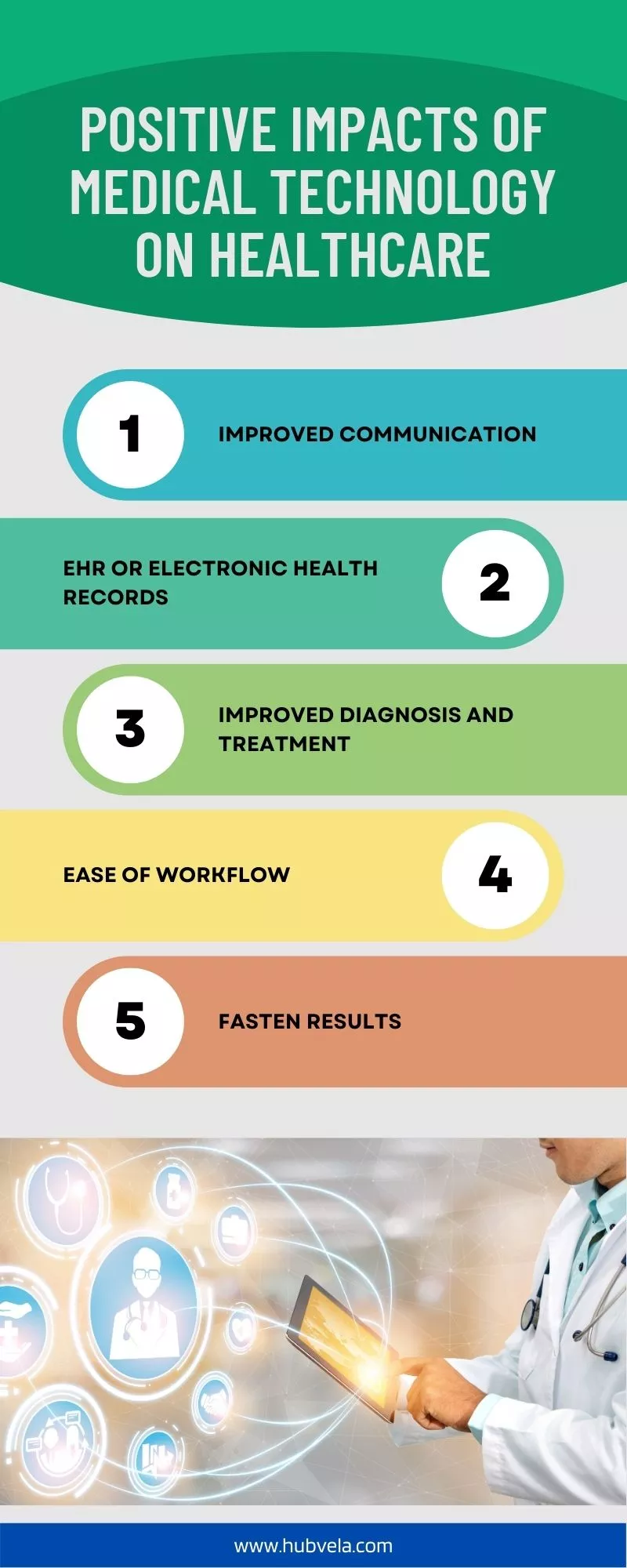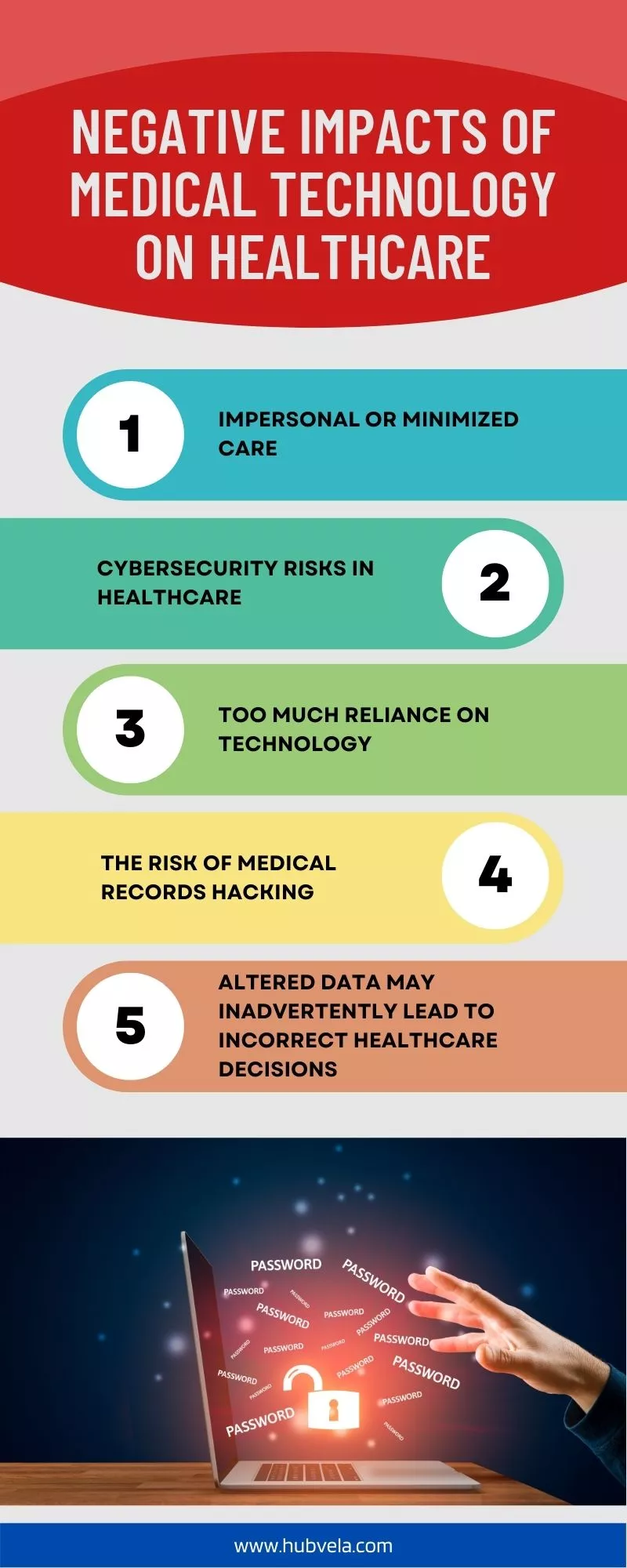Medical technology has revolutionized healthcare in many ways, from improving patient outcomes to increasing efficiency and accuracy in diagnosis and treatment.
However, it also has also its drawbacks.
As with any technological advancement, there are both positive and negative impacts of medical technology on healthcare.
While some argue that technology has made healthcare more impersonal and less empathetic, others believe that it has improved access to care and saved countless lives.
In this article, we will explore both the positive and negative impacts of medical technology on healthcare.

--Advertisement--
Positive Impacts of Medical Technology on Healthcare
Medical technology has had a significant positive impact on healthcare. The use of electronic health records has reduced the cost of outpatient care, while health information technology has improved patient safety by reducing medication errors and adverse drug reactions.
Medical technology tools have also safeguarded patient safety through alerts, flags, reminders, and consultations. Additionally, technology has made healthcare more accessible to patients through doctors and health websites.
Overall, medical technology has enhanced the healthcare industry’s ability to address patient needs.
We will explore some of the major positive impacts of medical technology on healthcare.

1. Improved communication
Improved communication is one of the positive impacts of medical technology on healthcare. Health information technology (HIT) has been shown to facilitate communication between healthcare providers, reducing medication errors and adverse drug reactions, and improving patient safety.
Digitalization of health records has also made it easier for healthcare providers to access patient information, leading to greater patient care and improved public health.
HIT has also enhanced communication between patients and healthcare providers, allowing for more efficient workflow and better coordination of care.
Overall, the use of technology in healthcare has led to improved communication among all stakeholders, resulting in better outcomes for patients.
2. EHR or Electronic Health Records
Electronic health records (EHRs) have had a positive impact on healthcare by improving patient care, safety, and effectiveness.
EHRs have the potential to improve clinical outcomes and reduce medical errors.
They also enhance collaboration among healthcare professionals, which can lead to better patient outcomes.
EHRs have replaced paper medical records and made it easier for health data like test results or medication history to be shared between healthcare providers.
The adoption of EHRs is considered a promising solution to improve healthcare delivery and patient outcomes
3. Improved diagnosis and treatment
Medical technology has had a positive impact on healthcare by improving diagnosis and treatment.
Health information technology, such as electronic health records, can improve the ability to diagnose diseases and reduce medical errors, leading to better patient outcomes.
Technology adoption in healthcare has also led to better diagnosis and treatment of patients.
Mobile devices in the hands of healthcare practitioners have improved patient diagnosis and treatment by providing access to medical information.
Overall, the use of medical technology has contributed to more accurate diagnoses and more effective treatments for patients.
4. Ease of Workflow
The positive impacts of medical technology on healthcare include improving the ease of workflow for healthcare professionals.
Technology has had a massive impact on nearly all processes and practices of healthcare professionals.
Clinical workflow directly influences the time it takes to complete tasks, and telehealth technology can help improve clinical workflow.
An improved workflow helps practitioners minimize the time and expense of processing patient information, which benefits patients as well.
Nursing technologies such as smart beds and automated IV pumps are also transforming patient care by streamlining workflows and reducing manual labor.
Overall, medical technology is helping to make healthcare more efficient and effective by improving workflows for healthcare professionals.
5. Fasten results
Fastening results in relevance to the positive impacts of medical technology on healthcare, it is evident that technology has revolutionized healthcare in many ways.
Medical technology has improved patient outcomes, reduced medical errors, and increased efficiency in healthcare delivery.
It has also led to the development of new treatments and therapies that were previously unavailable.
The use of AI, VR/AR, telehealth, wearable tech, and 3D printing are some examples of how technology is changing healthcare for the better.
Negative Impacts of Medical Technology on Healthcare
While medical technology has brought about many positive changes in healthcare, it also has some negative impacts.
The introduction of health information technology into clinical settings is associated with unintended negative consequences.
Technology can have both negative and positive effects on people and jobs in the medical field.
We will explore some of the major negative impacts of medical technology on healthcare.

1. Impersonal or Minimized Care
One of the negative impacts of medical technology on healthcare is impersonal or minimized care. The availability of technology can lead to the depersonalization of healthcare, which can have a negative effect on patients.
Patients may feel like they are not receiving enough attention from their healthcare providers, leading to feelings of isolation and dissatisfaction with their care.
However, it is important to note that health information technology can also improve patient safety by reducing medication errors and adverse drug reactions.
Therefore, it is crucial for healthcare providers to strike a balance between utilizing technology and providing personalized care to their patients.
2. Cybersecurity Risks in Healthcare
The increasing use of medical technology in healthcare has brought about many benefits, but it also poses cybersecurity risks.
Healthcare organizations are particularly vulnerable to cyberattacks because they possess a lot of sensitive information that is valuable to hackers.
Cyberattacks on the healthcare industry can result in negative impacts on the availability of essential healthcare services and challenge healthcare organizations in the delivery of patient care.
Hospitals are frequent targets for cyberattacks, and common attack methods include ransomware, malware, data breaches, DDoS, and crypto-jacking.
The unique nature of the information at risk and the consequences for patient safety make cybersecurity in healthcare a critical issue that requires attention.
It is important for healthcare organizations to implement robust cybersecurity measures to protect patient safety and privacy.
3. Too Much Reliance on Technology
While technology can improve healthcare through speed, efficiency, and accuracy, over-reliance on it can lead to negative impacts.
For example, relying too much on technology can lead to a lack of personal interaction between patients and healthcare providers.
Additionally, if the technology fails or malfunctions, it can cause serious harm to patients.
Therefore, it is important for healthcare providers to strike a balance between using technology and providing personalized care to their patients.
4. High cost of medical technology
Researchers generally agree that medical technology has contributed to rising healthcare costs. Today’s medical technology is more advanced, more effective, and in many cases, more costly than ever before.
While a particular new technology may either increase or decrease healthcare spending, taken together, they have increased healthcare costs.
However, some studies suggest that shifting from paper to electronic health records reduced the cost of healthcare.
Conceptualizing technology as a driver of healthcare expenditure suggests that new technologies might come with similar costs and higher quality.
5. Altered Data may Inadvertently Lead to Incorrect Healthcare Decisions
One of the negative impacts of medical technology on healthcare is that altered data may inadvertently lead to incorrect healthcare decisions.
Health IT systems permit the collection of data for use in quality management, outcome reporting, and public health disease surveillance and reporting .
However, if this data is altered or inaccurate, it can lead to incorrect diagnoses and treatments.
Patient care information system-related errors can occur due to improper interrelation or integration of information technology.
Cybersecurity risks also pose a threat to the exposure of private data or ransoms.
Therefore, it is important for healthcare organizations to ensure that their technology systems are secure and accurate to prevent any negative impacts on patient care.
Conclusion Positive and Negative Impacts of Medical Technology on Healthcare
In conclusion, medical technology has both positive and negative impacts on healthcare. Health information technology has been shown to improve patient safety by reducing medication errors and adverse drug reactions.
However, the use of technology in healthcare can also lead to a lack of empathy toward patient care.
It is important to recognize both the negative and positive impacts of medical technology in order to make informed decisions about its implementation in healthcare.
While there are potential risks associated with the use of technology, it can also have positive effects on physical health through the use of digital devices or apps.


